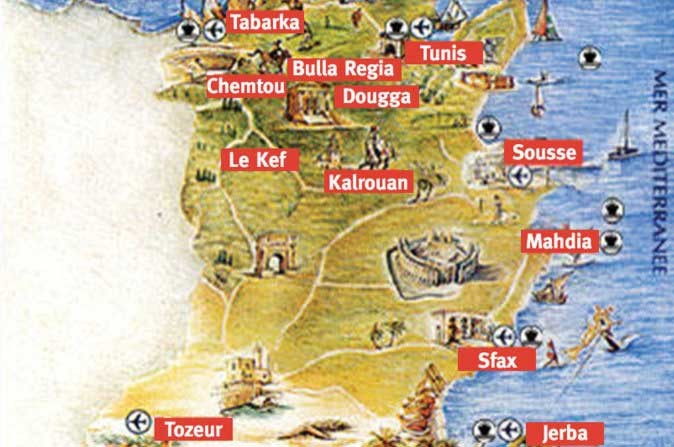Tourism / Tunisia
Drawing another map of Tunisia
Tunisia is a paradox: many have been there on holiday, but few can claim to know it. We invite you to embark on a journey of discovery beyond the clichés.

Tunisia successfully invented a new way of traveling: hotel resorts and short holidays. In the 80s, top-of-the-range hotels were springing up everywhere on the Eastern coastline. Content with catering to Westerners seeking sunny beaches, Tunisia approached the age of online reservations with a naïve insouciance born of its success. Tourism numbers remained steady, but only thanks to a low cost policy. Recently Tunisia has paid a dear price for its revolution. Tourists have become rare and they have concentrated in certain areas cluttered with holiday resorts. So, is Tunisian tourism in the doldrums?
A breath of fresh air
Far from it. Recently, a different vision of Tunisia has started to develop. Guest rooms are now opening up in rural areas or in the heart of the medinas. Variously known as green holidays, or cultural holidays, this new way of discovering Tunisia, offers local charm, authentic life, showcasing the country’s creators and designers. A new map of the country is being drawn up, bringing visitors closer to the people.
Soft landing
Spring and autumn are the best times to discover Tunis, with mild temperatures allowing long walks without undue exhaustion. In Tunis, La Chambre Bleue, a guest-house ensconced in a palace in the medina, is an ideal starting point for a wander through the medina and the recently refurbished kasbah. One cannot leave the capital without visiting the Bardo Museum, with its outstanding collection of mosaics of the Roman colonial period, considered the most important in the world. If you simply cannot resist the urge to take a peek at Sidi Bou Saïd and its cascade of blues, stay the night at one of its guest houses, where you can indulge in serene contemplation of the sun setting on the Bay of Tunis.
Northward bound
Renting a normal road car is perfectly adequate, but go for a 4×4 if what you want is a real sense of freedom. Sidi Mechreg, Ghar el Melh Peninsula, the beaches of Cap Blanc or Bechateur – these are just the beginning of a long series of beaches and deserted sandy inlets. Goggles, snorkel and picnic hamper are virtually a must in order to observe fish, small shipwrecks, cuttlefish and squid. After a succession of coves, you will suddenly come face to face with the red rocks of Tabarka, with even richer marine wildlife for those seeking the pleasures of underwater diving. Why not make a stop at Ichkeul Lake, a paradise of migratory birds? Or at Sejnane, with its chimneys used as nesting places by storks? Do not hesitate to leave the main road and venture into the farms, where you will be warmly welcomed, like everywhere in Tunisia, especially if traveling with children!
Historic Tunisia
Between Tabarka and the Kef there lie three outstanding archaeological sites: Dougga with its underground houses, Bulla Regia with its ancient theatre, and Chemtou with its golden marble mines. For a long time North Tunisia was Rome’s wheat granary, and a number of rare and seldom visited vestiges of this activity can still be found. Near Kef, specifically at El Galaâ, Jugurtha’s table is a rare natural feature totally ignored by the tourist circuits: a natural fortress resembling a giant mushroom rising in the middle of the plain. One feels awed by the solitary beauty of this immense promontory afording a breathtaking view of the old Numidian country and nearby Algeria.
Down to the South
The journey to the south of Tunisia along the west of the country is fraught with wild beauty. To immerse yourself in this ancestral environment, just do like the caravans of old – use the desert towns as resupply points! You will find charming hotels and lose yourself in the serenity of an oasis or venture out into the desert sands. Tunisians have a well-earned reputation for welcoming you into their homes and giving the best of themselves. A self that takes the best from an ancient country waiting to be discovered and from a new country now being built.
